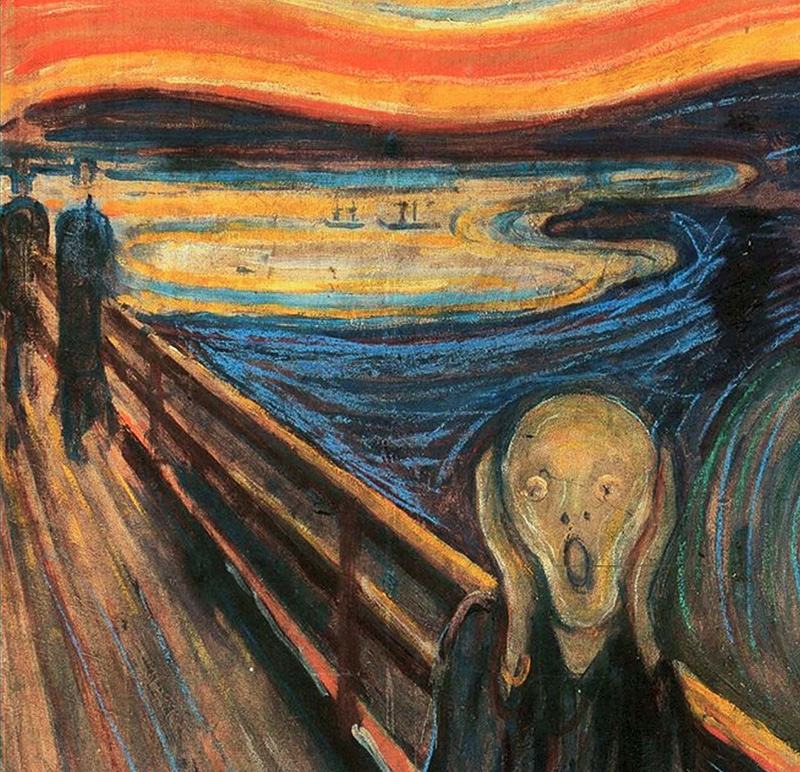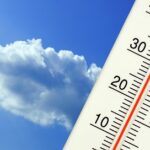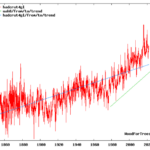
Edvard Munch.
Onder de titel, ‘Sexing up the threat’, schreef ik in augustus 2003 (!):
“Rising concentrations of greenhouse gases in the earth’s atmosphere, resulting from economic and demographic growth since the industrial revolution, are leading to potentially irreversible climate change. Human-induced emissions of greenhouse gases […] are changing how the atmosphere absorbs energy. The result is known as the enhanced greenhouse effect. Scientific evidence of the Intergovernmental Panel on Climate Change (IPCC) confirms that climate change is already taking place and that most of the warming observed during the last 50 years is attributable to human activities. There is a world-wide consensus of scientists on the problem of climate change and its causes. Scientists further project that the rate of change will be more rapid than previously expected. Projections for climate change, based on current scientific evidence, include the rise in global average surface temperatures by 1.4 to 5.8 degrees Celsius over the next 100 years. This projected rate of warming is the highest in 10,000 years. The rise in temperature is predicted to have strong adverse effects including rising sea levels (between 9 and 88 centimetres), more irregular precipitation patterns, and an increase in extreme weather events like droughts and storms.
“[…] A shift in temperature zones caused by climate change could seriously affect biodiversity and lead to a geographic shift in the occurrence of different species and/or the extinction of species in many locations as the world’s ecosystems will not be able to adapt as fast as the climate is changing. Changes in precipitation and more irregular precipitation will mean that water resources in many regions will come under further stress. This will affect both drinking water supplies and irrigation. Floods are further expected to increase water degradation. Moreover, higher maximum temperatures are expected over nearly all land areas. Warm seasons will become dryer in most mid latitude continental interiors, increasing the frequency of droughts and land degradation. This will be particularly serious for areas where land degradation, desertification and droughts are already severe. Sea level rise may also lead to the salinisation and loss of low-lying agricultural land.
“[..] Climate change is expected to have a clear negative impact on agricultural and livestock activities. Climate change will worsen food security and exacerbate hunger. [..] Changes in temperatures and precipitation are also likely to increase the geographic range of vector-borne diseases such as malaria and dengue fever and expose new populations to these diseases. Furthermore, droughts and flooding may increase water associated diseases such as cholera and dysentery, particularly in areas with inadequate sanitary infrastructures. The loss of landmass in coastal areas is likely to lead to increased permanent or temporary displacement of populations. Harbours, offshore infrastructure, coastal urban areas and tourist infrastructures are particularly at risk, while extreme weather events may also damage inland road, rail, and air infrastructure, thereby disrupting vital transportation systems.
“[…] Apart from having direct economic effects on already vulnerable livelihoods in terms of lost endowments and entitlements, the impacts of climate change are also likely to have major macro-economic implications, in both the short and the long-term perspective. Moreover, chronic food insecurity and deteriorating health conditions will put more pressure on national budgets and costs related to potential conflicts due to increasing water scarcity or mass migration may also be expected. Existing poverty and lagging development will amplify the adverse effects of both gradual changes in climatic conditions and extreme weather events, leading to economic losses, including costs for relief and reconstruction efforts that may consume a significant proportion of affected countries’ GDP.”
Is this quote maybe taken from the script for some Hollywood horror movie? Or is it perhaps taken from an “information” brochure of Greenpeace or the World Wildlife Fund? Or is it perhaps (even) more serious? Surprise, surprise … yes, it is. It is quoted from a staff working paper, of July 2003, by the European Commission on the policy context relating to a “Directive establishing a scheme for greenhouse gas emission allowance trading within the Community, in respect of the Kyoto Protocol’s project based mechanism”, which has recently been submitted to the European Parliament.
Lees verder hier.
Zijn alle beschreven verschrikkingen inmiddels werkelijkheid geworden? Nee, niets daarvan is uitgekomen. Is dat dan reden voor de EU om op te houden met het verspreiden van dat soort onzin? Nee, feiten mogen geen belemmering vormen voor de heilige decarboniseringsmissie van de EU.
Onder de titel, ‘Climate change poses increasingly severe risks for ecosystems, human health and the economy in Europe’, publiceerde het ‘European Environment Agency‘ (EEA) onlangs een rapport dat opnieuw bol staat van klimaatalarmisme.
Ik citeer:
Europe’s regions are facing rising sea levels and more extreme weather, such as more frequent and more intense heatwaves, flooding, droughts and storms due to climate change, according to a European Environment Agency report published today. The report assesses the latest trends and projections on climate change and its impacts across Europe and finds that better and more flexible adaptation strategies, policies and measures will be crucial to lessen these impacts.
The observed changes in climate are already having wide-ranging impacts on ecosystems, the economy and on human health and well-being in Europe, according to the report ‘Climate change, impacts and vulnerability in Europe 2016’. New records continue to be set on global and European temperatures, sea levels and reduced sea ice in the Arctic. Precipitation patterns are changing, generally making wet regions in Europe wetter and dry regions drier. Glacier volume and snow cover are decreasing. At the same time, climate-related extremes such as heat waves, heavy precipitation and droughts, are increasing in frequency and intensity in many regions. Improved climate projections provide further evidence that climate-related extremes will increase in many European regions.
‘Climate change will continue for many decades to come. The scale of future climate change and its impacts will depend on the effectiveness of implementing our global agreements to cut greenhouse gas emissions, but also ensuring that we have the right adaptation strategies and policies in place to reduce the risks from current and projected climate extremes,’ said Hans Bruyninckx, EEA Executive Director.
Lees verder hier.
Aldus het laatste nepnieuws uit EEA’s fantasialand. Hoe zou het toch komen dat velen tegenwoordig elites niet meer vertrouwen? Of, zoals Rypke zich onlangs afvroeg: ‘Wat te doen met het overschot aan nutteloze ‘hoger opgeleiden’?
Voor mijn eerdere bijdragen over klimaat en aanverwante zaken zie hier, hier, en hier.






Mooi stukje van Rypke inderdaad. Herinnert mij nog eens aan een verhelderend stukje “Mundia & Modia” van David Boxenhorn: http://www.rishon-rishon.com/archives/351860.html
Mijn hypothese is dat als gevolg van de ontkerkelijking steeds meer (dolende) mensen behoefte voelen aan een andere vorm van geloof. Het is niets meer dan een artefact van onze aangeboren hersenstructuur, want hoe zou anders kunnen worden verklaard dat vrijwel alle inheemse stammen elders soortgelijke overtuigingen en verhalen hebben?
Goed punt Joost. Ik denk dat de meeste zich tot de “vrije markt” hebben bekeerd. Deze toont veel gelijkenis met wat met bij een God zoekt.
Volgens mij hebben die mensen vroeger allemaal te veel science fiction boeken gelezen, en films bekeken.
Ze zijn in die onzin blijven hangen.
Deze is ook leuk…eerst Greta propaganda, en dan dit: https://www.vrijspreker.nl/wp/2020/02/dezelfde-time-die-greta-op-de-voorpagina-zet/
Die hang naar religie kan iedere ideoloog handig benutten inderdaad. Dat hebben Maurice Strong en Al Gore feilloos in de gaten gehad.
Echt bizar om dit zo te lezen. Ze zijn de weg in Brussel wat betreft klimaat volledig kwijt en ook met betrekking tot immigratie en het monetaire beleid m.b.t. de Euro zijn ze de weg compleet kwijt.
Tja, zijn er nog meer actuele belangrijke onderwerpen waarin je de weg kwijt kunt raken?
Voor wat betreft de vraag “Zijn alle beschreven verschrikkingen inmiddels werkelijkheid geworden?”, moet je goed lezen wat er stond: ” Projections for climate change … over the next 100 years”.
We zijn nu nog maar 16 jaar verder ten opzichte van 2003, toen dit geschreven werd. Dus dat de effecten nu nog niet dramatisch zijn, mag niet verbazen. Maar de trend is wel al ingezeet: De mondiale temperatuur blijft ontegensprekelijk stijgen. Warmterecords worden geregeld verbroken, kouderecords nagenoeg nooit. Het Noordpoolijs krimt. De eerste aanwijzingen dat er een versnelling is van zeespiegelstijging zijn er,…
De conclusie is correct: “Climate change will continue for many decades to come. The scale of future climate change and its impacts will depend on the effectiveness of implementing our global agreements to cut greenhouse gas emissions, but also ensuring that we have the right adaptation strategies and policies in place.”
Voor diegenen die kritiek hebben op de policies die momenteel uitgewerkt worden: indien je het er niet mee akkoord bent, wat stel je dan wel voor? Niets-doen, dat is geen optie!
Warmterecords worden verbroken omdat de oude (veelal eerste helft 20e eeuw) zijn geschrapt. Kouderecords (Groenland) komen niet in het nieuws. Noordpoolijs krimpt niet. Welke aanwijzingen van een versnelling van de zeespiegel? De mogelijk verschrikkelijke gevolgen van een bepaalde weervariatie verschijnen al vele decennia in de media, tot in de 19e eeuw. Logisch, de kranten moeten vol. Verschil met vroeger is dat tegenwoordig de EU en de VN het paniekzaaien in de media aansturen.